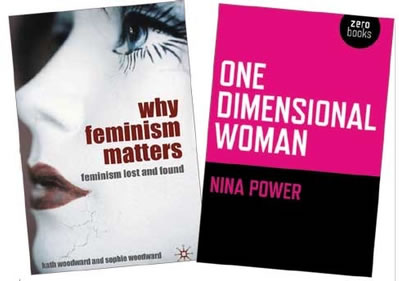 Why Feminism Matters: Feminism Lost and Found by Cath Woodward & Sophie Woodward (Palgrave, £50)
Why Feminism Matters: Feminism Lost and Found by Cath Woodward & Sophie Woodward (Palgrave, £50)
One Dimensional Woman by Nina Power (Zero Books, £7.99)
Whatever happened to the women’s movement? Feminism has crashed since the heyday of its 1970s “second wave”, allegedly a dirty word to many young women, who either feel equality has been achieved, or that feminists hate men.
It is therefore encouraging to find two books that insist the situation of women is political. In the consumer society with its obsession with celebrities and conformist images of glamour, a permissive attitude to “hedonism” (read pre-marital sex and drinking for young women as well as men) is combined with massive ongoing inequalities. In lad and ladette culture sexism has returned “ironically”, reduced to the frivolity of taking nothing seriously.
In her first book One Dimensional Woman, philosophy lecturer and frequent New Humanist contributor Nina Power tellingly pinpoints this world, in which, far from having achieved equality, women are forced to be both highly sexualised consumers and objects of consumption in a media-saturated world. She exposes with genuine originality the way in which the roles of woman as sexual/fashion object and as worker have been fused, so that “making the most of one’s appearance” means a woman producing herself simultaneously as willing worker and as sexual object. Straightened teeth, shaved armpits, dyed hair and “pampered” skin are compulsory in a conformist society. Women have become the Stepford Wives of the workplace, but it’s all discussed as though it were liberating – as in “when I get a pay rise I’ll treat myself to a boob job”. In entertainment culture, women are the entertainment, yet are seduced by the popular media to misperceive this as empowerment.
Power also skewers the awful fake, pain-free pseudo-feminism of glamorous celebrities, who equate it with superficial success plus self-indulgence, e.g. “cosseting” yourself with chocolate “because I’m worth it”. This hides and denies the real inequalities in society, the persistence of unequal pay, the dearth of adequate child care, the epidemic of domestic and sexual violence and the “pornification” of society.
Why Feminism Matters, written endearingly by a mother-daughter duo, the sociologists Cath and Sophie Woodward, makes a similar analysis from an academic perspective, their jumping-off point the disappearance of Women’s Studies in Britain. This does not, as these authors seem to assume, necessarily reflect a rejection of feminism, and to their credit they investigate new forms of feminist organisation, for example internet sites. These suggest that there is plenty of discontent among young women, but feminist organisation and political activity is fragmented. Feminists are active in all sorts of places: in the climate-change movement, in the abortion campaign (it’s going to have to be very active if the Conservatives win the next election), in protests against lap-dancing clubs and in ethnic minority communities (whose concerns differ in some respects), but the idea of an overall “Movement” to give women a powerful voice has been undermined by individualism.
The Woodwards identify a key problem in the way the situation(s) of women has been theorised since the 1980s. The postmodern attempt to “deconstruct” the “essentialist” category “woman” began as a way to refute the idea that women are “naturally” maternal, nurturing and so on, but hilariously (in a way – well, disastrously actually) merely succeeded in abolishing women altogether! The Woodwards point the finger at a major figure here, the fashionable postmodern theorist Judith Butler. I have never understood why Butler has become such a revered figure. What was true in her work (that, as Simone de Beauvoir said long ago, “one is not born, but one becomes, a woman”) is not new; and what was new (that sex and gender are “performances” totally unrelated to biological difference) was not quite true. In the end this idea that we simply perform our genders collapses into the American cliché that “you can be anything you want to be”. But if it’s all just a performance, why do we repeat the same old performances time after time – and why don’t they improve? I can “perform” until I’m blue in the face, but I am never going to be as tall as Laurie Taylor. To be fair, Butler is aware of these problems, although she has never satisfactorily resolved them. Her followers often seem not to be.
Attempting to do justice to the labyrinth of theory that has enclosed feminism like the Sleeping Beauty in her castle, the Woodwards tangle deeper and deeper in its thorny thickets. Perhaps it is unfair to criticise an academic text for being cast in dense academic prose, and these theories, like the situation of women, are complicated. Yet reading this book, despite its careful analysis and the many good points its authors make, reminded me that the relocation of the women’s movement into academia was always a retreat from action to the contemplation of representations.
The genius of Marxism (and this also applies to certain religions) is that it provided a sophisticated analysis of capitalism that could achieve a high level of abstraction, but could also, and much more potently, be simplified into a polemical call to action. People protest and fight for change when they are angry, and the reader is going to be exhausted rather than aroused to action by 200 pages of obscure jargon. Which is a pity since the Woodwards’ intentions are the best and they hit many targets, if only you could clearly see it.
Nina Power’s often impassioned polemic is also at times muffled by her attempt to include some theory and its tone veers from populist to over-complicated. At 74 pages this is more than a pamphlet, but cannot be a fully nuanced analysis. It is sometimes brilliant, but I wished it had been shorter.
Perhaps these authors – unlike Guy Debord in the 1960s in his famous polemic The Society of the Spectacle, which did arouse the soixante-huitards to action – cannot quite bring themselves to echo his wholesale denunciation of the total commodification of society. For there is pleasure in clothes and popular entertainment. Yet it is not the pleasure but the terms of its deployment in a grossly exploitative society that should enrage us. That was the original message of Women’s Liberation: pleasure and freedom on our terms, not in terms of economic profit. It is this that has been forgotten. Now we need to say it all over again – the message of these two deeply felt texts boiled down to ten pages – or perhaps a poster.

